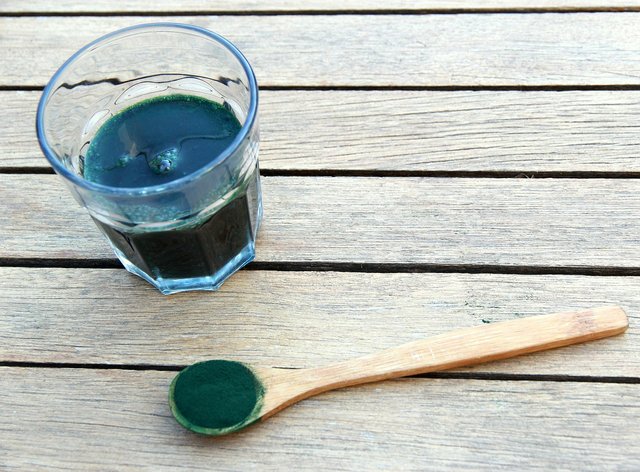What Are Some Health Benefits Of Spirulina

Spirulina is said to be the most nutrients dense food in the world.Spirulina was consumed by the Aztecs back in the day but became popular again when NASA proposed that it could be grown in space and used by astronautsIt’s a kind of blue-green algae that grows in fresh and salt water.It lives up to this reputation and is a great source of protein, vitamin B1, Iron, Calcium. It also contains decent amounts of magnesium, potassium and manganese, and small amounts of almost every other nutrient that we need.It contains high-quality protein and is often compared to eggs for the amount of protein per gram. The protein in Spirulina is highly usable and has a net protein utilization rate of between 50-61%vitamin B1 is necessary for the digestion of fats and proteins.Spirulina is a favourite food for vegetarians and vegans because it is one of the best plant sources of iron. The iron in spirulina is easily absorbed by our body and brings calmness to the digestive system. It has 26 times more calcium than milk.If we take gram for gram then spirulina may be the most nutritious food on the planet.A tablespoon of spirulina contains a small amount of fat (around 1 gram), including both omega-6 and omega-3 fatty acids in about a 1.5:1 ratio.The protein in spirulina is of good quality just like eggs with all essential amino acids that our body needs.A single tablespoon (7 grams) of dried spirulina powder contains, 4 grams of protein, Vitamin B1 (Thiamin), Vitamin B2 (Riboflavin), Vitamin B3 (Niacin), Copper and Iron.
Balance blood sugar
Studies display that spirulina may balance our blood sugar level and may even be as potent as some diabetes medication in some cases.Apart from lowering lowers blood sugar, t may also lower HbA1c, which is a long term marker of blood sugar levels and has outperformed metformin (diabetes drug) in some cases.In a study, Spirulina showed a decrease in blood sugar levels for 25 patients (2-gram spirulina) with type 2 diabetes.
Powerful anti-oxidant and anti-inflammatory properties
The anti-oxidant content in spirulina is called phycocyanin which is a strong anti-inflammatoryan independent laboratory who tested spirulina found it to have an ORAC of over 24,000 which is equal to 4 times that of ORAC of blueberries.ORAC (Oxygen Radical Absorbance Capacity) score is the measurement of ability of antioxidant and its concentration in various food.
Alleviates sinus issue (allergic rhinitis)
Spirulina reduces the inflammation that sinus problems in some people.Allergic rhinitis may be due to environmental allergens, animal hair, such as pollen or wheat dust.In a study conducted on 127 people with allergic rhinitis, 2 grams of spirulina per day dramatically reduced symptoms like sneezing, nasal congestion, nasal discharge and itching.
Detoxes heavy metal
Spirulina helps eliminate toxins from the blood and boost immunity due to its high chlorophyll content.In a study, half a gram of spirulina everyday with zinc supplement was able to remove arsenic toxicity by 50 percent.The toxicity caused by arsenic is a major problem as it effects people from around the world.According to the World Health Organization, U.S. is heavily affected by inorganic arsenic toxicities that is naturally present at high levels.
Muscle and endurance benefits
Exercise-induced oxidative damage is a major contributor to muscle fatigue.The antioxidant properties can help athletes and physically active individuals reduce this damage.Spirulina is known to increase fat burning during exercise. Its high antioxidant content makes it beneficial in reducing exercise induced oxidation which leads to muscle fatigue and inability to gain muscle.In fact, studies found that it:
- Increased endurance
- Decreased muscle damage from exercise
Help prevent cancer
Spirulina in low doses has been noted to decrease the rate of oral lesions in tobacco users.One intervention in Kerala India measuring oral leucoplakia (Thickened, white patches inside the mouth) in tobacco users noted that 1g Spirulina daily for a year was associated with complete regression of lesions in the oral cavity in 45% of persons in this group.C-phycocyanin (from the protein fragment of Spirulina) is associated with protection from colon cancer in part due to its ability to inhibit excessive production of COX-2 in colon cells, which tends to be increased in colon cancer cells.
Lowers blood pressure
Spirulina contains a pigment called Phycocyanin which scientist believe has antihypertensive (lower blood pressure) effects.The decrease in blood pressure has been observed in humans with 4.5 grams of spirulina after 4 weeks of treatment.
lower LDL and triglyceride level
Spirulina is effective in lowering LDL and triglyceride and have shown to increase HDL cholesterol.In a study done on 25 individuals with type 2 diabetes, 2 grams per day of spirulina significantly improved these markers.Another study in people with high cholesterol found a reduction in triglyceride (by 16.3%) and LDL (by 10.1%) with consumption of 1 gram of spirulina.
Protects LDL cholesterol from oxidising
The oxidation of fatty structures in the body can drive the progression of many diseases. This is known as lipid peroxidation and is a key driver of many serious diseases.The LDL lipoprotein being oxidised in the bloodstream is one of the key steps in the pathway to heart disease.The antioxidant of spirulina can help prevent this from happening.
Note: this article is from own website theholisticwellbeing
More more info refer to my website
Hi! I am a robot. I just upvoted you! I found similar content that readers might be interested in:
https://www.healthline.com/nutrition/10-proven-benefits-of-spirulina